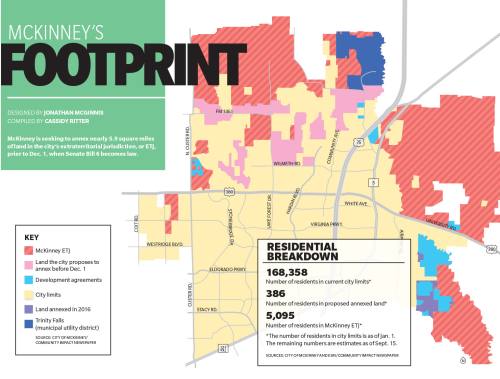If the city of McKinney were to annex the approximately 116 square miles within the city’s extraterritorial jurisdiction, or ETJ, which would take years to do as the city cannot annex more than 10 percent of its incorporated area in a calendar year, the city would nearly double in size from its current estimated size of 68 square miles.
The possibility of McKinney annexing all of its ETJ—or land outside the city limits it is legally allowed to incorporate—is becoming less of a reality because of a new law that passed in the Texas Legislature’s special session in July.

Senate Bill 6, which goes into effect Dec. 1, will allow residents living in areas up for possible annexation to decide to be annexed by petition or hold a referendum.
“For all intents and purposes, [this bill] will stop most growth in the city of McKinney outside where we’re already incorporated, so our growth will happen [within current city limits] and where we’ve already annexed,” McKinney Mayor George Fuller said. “But beyond that it’s going to be very difficult.”
For a Tier 2 Municipality such as McKinney, under SB 6, registered voters in an area proposed for annexation that has more than 200 people would need to consent through an election. If the area has less than 200 people, consent would need to be gained through a petition signed by more than 50 percent of the registered voters in the area. If at least 50 percent of the landowners are not registered voters, a petition must be signed by more than 50 percent of the landowners in the area.
Fuller said the likelihood of residents approving annexation is “extremely unlikely.”
Prior to Dec. 1, the city is proposing to annex several properties totaling approximately 5.9 square miles of land in the northwest sector of the city. The proposed pieces would help “square off” McKinney city limits, City Attorney Mark Houser said.
However, critics of the proposed annexation call this move a “forced annexation.”
Jason Blake, who lives on approximately 33 acres in the city’s ETJ, said he received a letter from the city Sept. 6 notifying him of the city’s intent to annex his property. Blake, who said he likes living in the ETJ, said he recently purchased a $10,000 septic system and does not need the city’s sewer or water services.
“We feel like the city of McKinney is violating the spirit of the law,” Blake said in an email. “The state of Texas Legislature and governor just spoke loudly against these types of actions and signed a law to stop cities from forcibly annexing private property. The city is using a loophole.”
The city of McKinney openly opposed the bill, City Manager Paul Grimes said.
“We think this is one of the worst bills adopted because it greatly hampers local government [and] local communities’ ability to grow and … control our own destiny,” Grimes said. “So it’s going to be a challenge for us.”
Residential impact
By annexing property, the city is growing its tax base, Grimes said. If it is harder to expand the tax base, the current residents will continue footing the bill.
If the city plans for a parcel of land in the ETJ to be used for commercial development but is developed as residential prior to annexation, the long-term sustainable tax base for the city changes, said Michael Quint, executive director of development services.
Grimes said he and city staff understand that people choose to live in the ETJ for a reason.
City’s plan of action
The city has until Dec. 1 to annex properties under the existing law and existing exemptions.
Prior to annexing the proposed properties, two public hearings will be held Oct. 16 and 17. A vote of approval by City Council will take place at a City Council meeting before late November, which is within the 120-day requirement to complete the process per state law, Grimes said in an email.
City Council approved a resolution for strategic annexations on Aug. 26, which allows the city manager to direct staff to conduct necessary activities required to potentially annex the 5.9 square miles of land.
At a Sept. 19 meeting, council approved the city manager to execute “all necessary development agreements in association with the pending municipal annexations generally located in the northwest sector of McKinney,” according to city documents.
All landowners will be given the option to sign a non-agricultural development agreement or agricultural annexation agreement before the city moves forward with the proposed annexation, Grimes said.
“People brag about North Texas and the opportunity and the growth and all of that. Well, part of that growth is our ability to grow. Take that away and by definition it stops,” Fuller said. “You can argue it’s good for the people in the county; you can argue the property rights side of it; but at the same time you are going to have to understand that, that will come with a cost to us financially for everybody in this area.”




